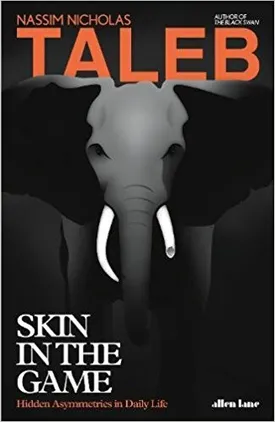Skin in the Game: Hidden Asymmetries in Daily Life by Nassim Taleb
Nassim Taleb argues that in modern life, there are hidden, often dangerous, forms of risk and inequity in our society that few people understand. In his book Skin in the Game: Hidden Asymmetries in Daily Life, Taleb explains these hidden risks and injustices, showing us why it’s important to consider them and how we can attempt to reduce them.
Taleb starts his book by discussing how we all possess various forms of “skin in the game”- jobs, relationships, and beliefs- and how we depend on our skin in the game to protect us from harm. We all have a vested interest in the results of our decisions, and it's important to remember that the success or failure of any endeavor can depend on how we manage those risks. By emphasizing our responsibility to recognize risk, Taleb reinforces the importance of having a stake in our actions, and understanding the consequences of our decisions.
The book also explores the concept of societal asymmetries, or disparities between groups in our society. According to Taleb, these asymmetries are often hidden in everyday life, especially in the business world. For instance, corporate executives are typically rewarded with large bonuses and other rewards that do not always reflect the overall success of the company. Similarly, Taleb points out that small business owners often take on more risk than large corporate bosses, and yet, they rarely enjoy the same level of rewards and financial security.
Furthermore, the book delves into the idea of "silent risks," which Taleb considers to be those risks which we cannot see. From car accidents and market fluctuations, to bad business decisions, Taleb argues that these hidden uncertainties are all too often overlooked. Understanding these silent risks, however, can help us make better decisions even when faced with unknowns.
Taleb then moves on to suggest ways to reduce these hidden risks, or at least make them less dangerous. He emphasizes the importance of accountability, transparency, and actively seeking out risk management strategies. It is also important to note that Taleb urges individuals to consider the cost of their decisions beyond the immediate financial implications, taking into consideration long-term societal and environmental impacts.
In the end, Taleb’s book Skin in the Game strives to shed light on the hidden asymmetries and risks that we often fail to consider in our daily lives. By understanding the risks we take on and the consequences of our decisions, we can make better decisions and attempt to create a fairer, more equitable society. With insighful analysis and vivid examples from the corporate and political realms, this book is an essential read for anyone looking to better comprehend hidden risks and asymmetries in daily life.

